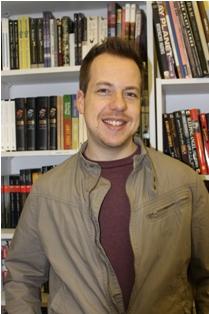Poet Sean Zio started the Creative Writing Play Date in 2007 as a way to expand on the writing classes he taught for the City of Ottawa. Now celebrating its fourth year, the Play Date has proven to be a very intimate way for local writers to explore their craft and share their work.
Xtra recently chatted with Zio about the group.
Kandace Blaker: Who is welcome to attend the Play Date, and what can new members expect to experience during one of the gatherings?
Sean Zio: The Play Date is open membership and welcomes any skill level. For the first half of the evening, the group silently works in response to creative writing prompts that focus on a literary tool. In the second half, the group reconvenes and each member reads his or her piece aloud. Time allowing, the group provides constructive feedback.
What were you hoping to achieve through this group?
I really wanted this group to be a space where people are encouraged to create and write, and this is exactly what is has been since we started. The Play Date operates with an aim toward inclusivity and models itself upon anti-oppressive politics where each individual of the collective has the right to speak and be a part of the decision-making process. Hopefully, the Play Date can act as a place where writers work together to help each other grow as literary artists.
What do you think it is that makes this get-together a welcoming environment for first-timers?
Artists are generally sensitive and timid people who have survived years of others telling them that they or their work are not good enough. I do my best to create an inclusive space for people to feel safe as artists.
The Play Date is only one of the many ways you have been active within the community. What has been the driving factor behind all of your contributions?
I grew up with a strong sense of duty toward community service, and volunteering in the gay community was an extension of that duty. Eventually, I found that I felt much more comfortable working in a more inclusive, anti-oppressive environment where people of all types could get involved. Nowadays, I focus my activism on the Play Date and other creative outlets, which include LGBTQ members, but are not exclusive to the gay community.
Some people view writing as a form of therapy, as a way to cope with/express the challenges and joys of their own lives. Would you agree?
I definitely agree. For me, the power of the written word is that one can pour his or her heart out onto a page and then give it to someone else who will then go to a quiet corner and process it in his or her own time. The basic element of privacy inherent in writing and reading is what makes this form so conducive to therapy.
With the Play Date, I expose this privacy by making each member read his or her piece to the group after writing it. I like to use this act of reading as a reminder to writers that we are communicating with an audience. It is easy to get caught up in our journals and hidden emotions. But the written word has the power to reveal our inner worlds through images and lyrical prose that can be entertaining and meaningful for other people to receive. Throughout recorded history, words have been a touchstone between generations and people, reminding us that we are never alone.
Why do you think it is especially important for gay men and women to have a creative
outlet?
Oppression works best when people are silent about their suffering and when they turn the hate of society toward themselves. The one thing oppression hates the most is seeing the oppressed as joyous and happy despite, or in spite of, their oppression. For this reason, the LGBTQ have a duty to fight against their feelings of oppression by rising up and creating in some meaningful form, thereby leaving behind a record of having existed and of having existed with power, intent and joy. As a gay man, I have overcome great self-hatred due to the records left behind by Walt Whitman, EM Forster and Alice Walker, to name a few. The more LGBTQ people become engaged in the act of creation, then the more our histories will be heard and passed on to our peers and the future generations who will stand upon our shoulders like we have stood upon the shoulders of our LGBTQ ancestors.
The Deets:
The Creative Writing Play Date
Every Tuesday from 8pm until 10pm
Mother Tongue Books
1067 Bank St
creativewritingplaydate.com

 Why you can trust Xtra
Why you can trust Xtra


